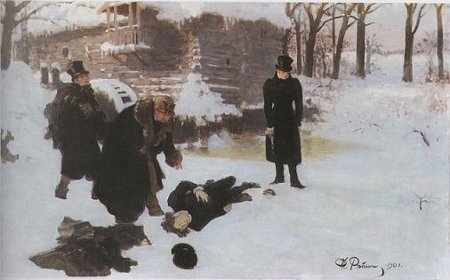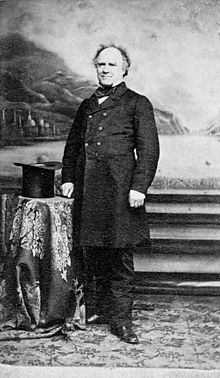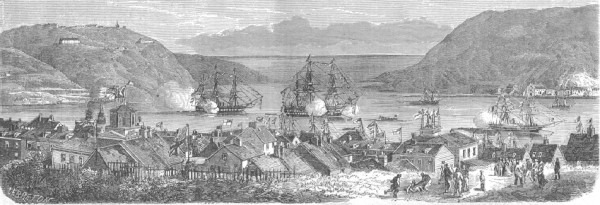Canada Day is upon us and what better way to celebrate the "true North strong and free" by taking a look into our country's history. We've come a long way from July 1st, 1867 when just three colonies were united under the British North American Act. 147 years later we now have a nation spanning from "sea to shining sea" which includes numerous provinces and territories. Many people associate dueling with Europe, or the stand offs at sunrise in the American West- but Canada has had it's share of duels. From lawyers, to politicians, journalists, to jaded lovers, doctors and school teachers, many of Canada's first colonists picked up pistols to settle their differences. So, in honour of Canada's birthday let us look at five duels from the pages of our country's history.
A NOT SO SMALL AFFAIR
Being fatally shot is not how most Canadians would want to spend their Christmas holiday.
Upper Canada’s first attorney general made a fatal mistake after he caught running his mouth off and gossiping at a Christmas party one night. John White, who was also Canada’s first lawyer and the founder of the law society, had likely had a bit too much a drink and began telling stories to the other party guests about the wife of John Small, who was the clerk of the executive council of Upper Canada. Apparently Mrs. Small had once been the mistress of the Duke of Berkeley when she used to live in England. When the duke tired of Mrs. Small’s favours he paid John Small to marry the woman and take her away to the colonies so that he could be rid of her. Regardless of whether or not the rumours were true, such tales are not the sort that John White should have been blabbing about at a Christmas party. The result of John White shooting his mouth off was that he himself was then shot and killed days later after John Small challenged him to a duel.
The plaque which marks the location on Canada's final fatal duel in Perth, Ontario
Many duels in history have been fought over a woman. In the case of the last fatal duel fought in Canada, the woman was a school teacher from Perth, Ontario named Elizabeth Hughes. John Wilson and Robert Lyon were both law students and good friends, but unfortunately matters of the heart can often tear such friendships apart. The two men quarreled over remarks Robert Lyon had made about the young school teacher and a duel was challenged to settle the matter. John Wilson killed his former friend on a rain-soaked field on June 13th, 1883. Wilson's outcome was quite a lot sweeter then that of Robert Lyon. John Wilson was acquitted of the murder and went on to marry Elizabeth Hughes- for whom the duel was fought over in the first place- and later found success as a Member of Parliament and as a judge.
THAT'S HOWE IT'S DONE
Joseph Howe: politician, poet, public servant and pistol-wielding Nova Scotian.
Joseph Howe, was a Halifax man from a loyalist family who settled down in Nova Scotia after the end of the American Revolutionary War. He was a first generation Canadian who fiercely loved his East Coast home and spent much of his life writing about Nova Scotia’s breathtaking geography and the people who inhabited the land. Howe was a man of many talents and interests- some of which caused him to ruffle more than a few feathers in his day. Howe was not only a well known journalist in Nova Scotia, but his writing skills also branched over into poetic prose and essays. He was also a public servant and a one of those very rare, well-loved politicians. However, not everyone was fond of Joseph Howe and in 1840 one such gentleman of Nova Scotian high society called out Howe on some of his populist writings and challenged him to a duel. His upper class opponent fired first and missed, so Howe then fired his shot up into the air which won him the right to refuse future challenges.
THE LAST DUEL IN CANADA
St.John's, Newfoundland was was where the last duel took place in 1867.
Well, technically in August of 1867 St. John's Newfoundland was not Canadian territory at the time- but for the sake of this article we're just going to roll with saying that the last duel fought on Canadian soil took place here. Like so many duels this one was also fought over the affections of a young lady. When two friends Mr. Dooley and Mr.Healey fell in love with the same woman the two agreed that the only way to settle the matter was over pistols at dawn. The morning of the duel, both men were less enthused about the idea as they had been in the midst of their heated argument from a few nights (and most likely into a few beers) before. The love of a lady be damned- Dooley and Healey had been longtime friends and now they were going to meet and fire shots at each other. When the men had walked ten paces, turned and fired it was who Dooley hit the ground. Healey gasped, stricken with horror thinking he had killed his friend and he rushed over along with both men’s seconds towards Dooley’s limp body. It turned out that Dooley had merely fainted and Healey was overcome with relief. Both Healey and Dooley’s seconds (who were longtime friends of the two) confessed that they had been worried about the outcome of the duel and- despite breaching a major rule of duelling etiquette- loaded the pistols with blanks. Having realized that the lady of their affections was not worth the life of a good friend, both parties decided that honour had been satisfied and everyone got to walk away with their lives.


